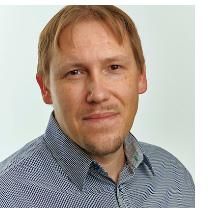The EEGLAB News #10
Cyril Pernet, Ph.D.
Senior Research Software Developer, Ph.D.
Organization for Human Brain Mapping Fellow,
Software Sustainability Institute Fellow
Neurobiology Research Unit, Copenhagen University Hospital,
Rigshospitalet,
Copenhagen, Denmark
“Code sharing is like data sharing; We need it for good science,” says Dr. Cyril Pernet, who has always been a strong advocate for data sharing, open source, good practices and open, reproducible science. As a cognitive neuropsychologist and Senior Research Software Developer at the Neurobiology Research Unit (NRU), Copenhagen University Hospital, Rigshospitalet in Denmark, he conducts research in three areas: (1) methodological and statistical issues in brain imaging, (2) translational imaging, and (3) neuroinformatics (data sharing, good practices, code).
“Many brain imaging methods -- such as functional magnetic resonance imaging (fMRI), positron emission tomography (PET), and electroencephalography (EEG) -- have been developed to study the normal brain. A major challenge is to translate these discoveries and methods to clinical settings," Dr. Pernet explains. "Implementing such knowledge to benefit patients, and in particular those with brain tumors, is a prime example of how methods, translational research and neuroinformatics intersect. For instance," he continues, "I have co-developed new methods to map eloquent cortical areas, implementing the tools and pipelines to run analyses prior to tumor surgery." Dr. Pernet is also involved with the European Network for Brain Imaging of Tumours (ENBIT) (https://www.enbit.ac.uk/) and the Glioma MR Imaging 2.0. COST network (https://glimr.eu/), both dedicated to advanced clinical imaging of brain tumors. (Photo below: Members of the the Neurobiology Research Unit (NRU) at Copenhagen University Hospital Rigshospitalet in Denmark).
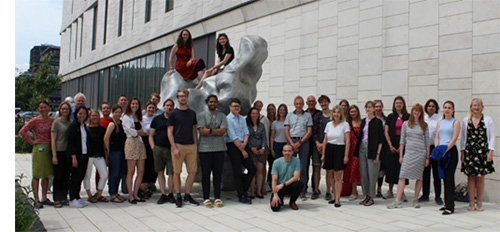 Translational neuroimaging studies face the problem of reproducibility: “In the clinical context,” Dr. Pernet elucidates, “a commonly heard concern is: ‘We have patient data, therefore, there are privacy issues,’ and so people don't even try to share data. But without access to the data, we cannot reproduce analyses." To date, there is no commonly accepted version of a consent form which would allow imaging data to be openly shared while guaranteeing research participants’ privacy. But Dr. Pernet believes there is a solution. “This situation really upsets me because there are ways we can do it,” he asserts. “It doesn't have to be completely open on the web so that everybody can download the data. I've been working on many open science related projects, and the Open Brain Consent and Open NeuroPET are part of that line of work.”
Translational neuroimaging studies face the problem of reproducibility: “In the clinical context,” Dr. Pernet elucidates, “a commonly heard concern is: ‘We have patient data, therefore, there are privacy issues,’ and so people don't even try to share data. But without access to the data, we cannot reproduce analyses." To date, there is no commonly accepted version of a consent form which would allow imaging data to be openly shared while guaranteeing research participants’ privacy. But Dr. Pernet believes there is a solution. “This situation really upsets me because there are ways we can do it,” he asserts. “It doesn't have to be completely open on the web so that everybody can download the data. I've been working on many open science related projects, and the Open Brain Consent and Open NeuroPET are part of that line of work.”
The Open Brain Consent of which he speaks (and of which he is a co-author) is an international project that aims to provide researchers in the brain imaging community with information about data sharing options and tools. Another goal of the project is to help standardize anonymization of neuroimaging data to simplify data sharing. (Read a summary of the initiative here). Open NeuroPET is an international project for data sharing, with an emphasis on positron emission tomography (PET) data. The project aims to facilitate data sharing, in particular for GDPR governed data, by making metadata public via OpenNeuro (i.e. the public can see and search what are there) but not necessarily open access (i.e. authentication might be required).
Background. 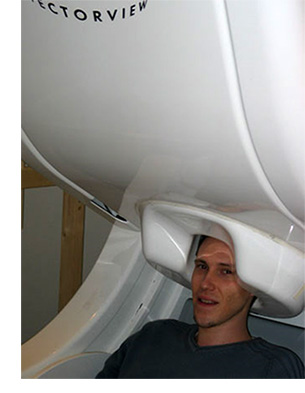 Dr. Pernet’s entrance into the field of cognitive neuroscience began in France. Born in the north of France, he studied psychology and biology in Lille before moving to Toulouse where he obtained his Ph.D. in Cognitive Neuropsychology in 2004. During that time, he was working at the National Institute for Health and Medical Research (INSERM) where he learned EEG and (f)MRI, already combining fundamental research and patient work (thesis on visual information processing and dyslexia). He moved to Finland in 2005 for his post-doc fellowship from the Fyssen Foundation. “It was there,” he shares, “that I deepened my understanding of neurophysiology working with Magnetoencephalography (MEG) - and I started my journey into coding.” (Photo to right: Dr. Pernet in the 306 channels vectorview MEG system of the Low Temperature Laboratory in Helsinki, Finland)
Dr. Pernet’s entrance into the field of cognitive neuroscience began in France. Born in the north of France, he studied psychology and biology in Lille before moving to Toulouse where he obtained his Ph.D. in Cognitive Neuropsychology in 2004. During that time, he was working at the National Institute for Health and Medical Research (INSERM) where he learned EEG and (f)MRI, already combining fundamental research and patient work (thesis on visual information processing and dyslexia). He moved to Finland in 2005 for his post-doc fellowship from the Fyssen Foundation. “It was there,” he shares, “that I deepened my understanding of neurophysiology working with Magnetoencephalography (MEG) - and I started my journey into coding.” (Photo to right: Dr. Pernet in the 306 channels vectorview MEG system of the Low Temperature Laboratory in Helsinki, Finland)
Dr. Pernet’s passion in neuroscience then took him to Scotland - first as a post-doc fellow at the University of Glasgow (where he performed research and oversaw the creation of the voice and EEG lab there), and then at the University of Edinburgh’s Brain Research Imaging Center as fMRI lead for SINAPSE (Scottish Imaging Network A Platform for Scientific Excellence). “I became Academic Fellow, and Senior Academic Fellow when all imaging activities merged into Edinburgh imaging – and I became the scientific contact for all functional imaging studies at Edinburgh.” There, he also taught fMRI/EEG/Statistics to students, and performed research in the areas of language and categorization with a focus on methods and clinical applications.
“Thanks to my ever-growing interest in open science, programming and reproducibility (and a fellowship at the Software Sustainability Institute), I am now a Senior Research Software Developer at NRU,” he shares enthusiastically. “I still work on brain imaging and methods, but I also build tools for data sharing and for automated, reproducible data analyses with a focus on PET and multimodal PET/fMRI and PET/EEG, and then distribute these methods through open-source toolboxes.”
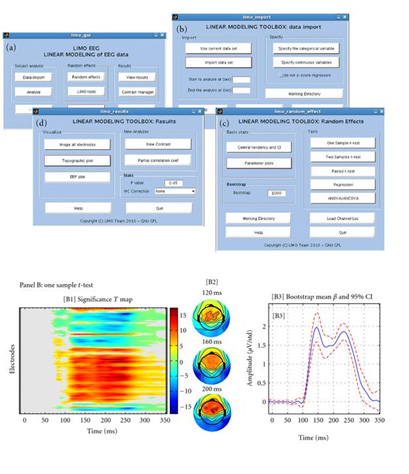 EEGLAB and LIMO Toolbox. In fact, it was his work developing tools that brought Dr. Pernet to the Swartz Center for Computational Neuroscience (SCCN) in 2015. “I have been collaborating with SCCN – especially with Arnaud Delorme, Ph.D. and Tim Mullen, Ph.D – for over 10 years,” he shares. “Most of this work involved developing statistical methods.”
EEGLAB and LIMO Toolbox. In fact, it was his work developing tools that brought Dr. Pernet to the Swartz Center for Computational Neuroscience (SCCN) in 2015. “I have been collaborating with SCCN – especially with Arnaud Delorme, Ph.D. and Tim Mullen, Ph.D – for over 10 years,” he shares. “Most of this work involved developing statistical methods.”
One such collaborative project – the Linear Modelling (LIMO) toolbox – is an EEG analysis plug-in for EEGLAB that Dr. Pernet authored. LIMO is a Matlab-based code aimed at providing full sensor or source space (statistical) analyses of EEG or MEG data. LIMO is 100% compatible with EEGLAB. (See GitHub repository for more information; The LIMO tutorial is available here, additional LIMO documentation is here and here. A series of short how-to YouTube videos is also available here. Read an article about LIMO here.)
Dr. Pernet explains how the project began: “Having done a lot of fMRI, using hierarchical linear models seemed like an obvious thing to do for EEG. Of course, various aspects needed to be worked out, both from the method but also from an integration with EEGLAB standpoint.” He and Dr. Delorme have now completed version 3.2, which is fully integrated with EEGLAB using the new EEGLAB STUDY structure. (Figures to left - Top: The four main GUI windows of LIMO EEG. Bottom: Example analyses and results obtained with LIMO EEG, including results of a one-sample-test performed on a phase coherence regressor).
Dr. Pernet plans to continue his work on the LIMO tools, which he expects will keep evolving. He also anticipates working on “several ongoing projects, in particular independent component source space statistics, and decoding models.” He clarifies, “Some of these require further integration of tools from Dipfit and Fieldtrip.”
EEGLAB Workshops. Because EEGLAB is a vital part of Dr. Pernet’s research, he regularly teaches at EEGLAB workshops, which are held worldwide. The first workshop he participated in – the Thirteenth EEGLAB Workshop – was held in the village of Aspet in the Pyrenees mountains in France, in 2011. He has participated in several workshops since. And recently, eight years after his first such meeting, he attended the 29th EEGLAB Workshop at the same location (photo below).
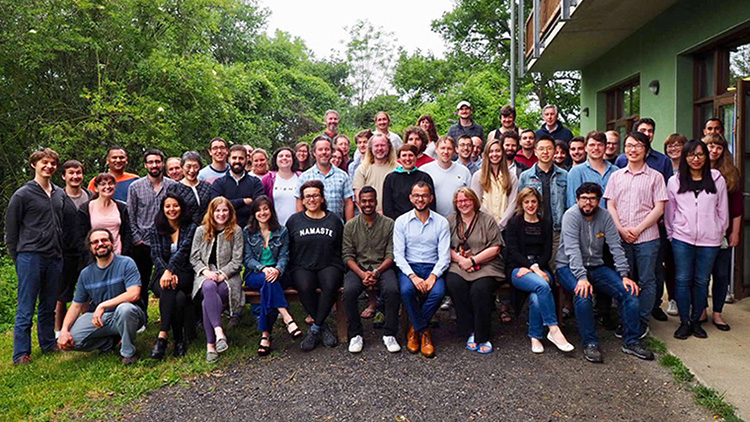
Dr. Pernet (2nd row middle, white shirt) attends the 29th EEGLAB Workshop (June 2019) at the Bois Perché holiday camp in Aspet, France. Photo below, participants take a short break to enjoy the hills of Aspet, France (click here for more photos/info about this event)
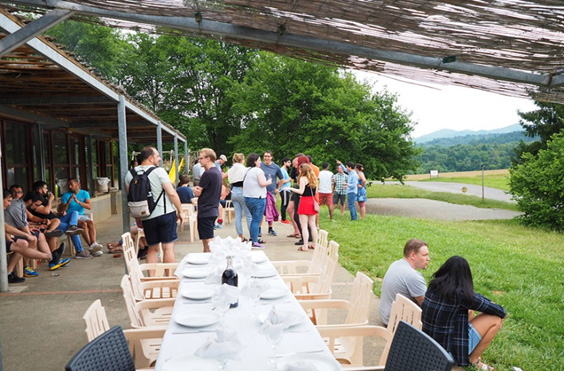 The Future. Dr. Pernet has taken on many roles throughout his multi-faceted career – from developing methods and applications for translational imaging, to teaching, overseeing the development of an EEG lab, being key scientific contact for imaging studies, and building tools for data sharing and distributing these methods through open-source toolboxes.
The Future. Dr. Pernet has taken on many roles throughout his multi-faceted career – from developing methods and applications for translational imaging, to teaching, overseeing the development of an EEG lab, being key scientific contact for imaging studies, and building tools for data sharing and distributing these methods through open-source toolboxes.
Whatever his future holds, it seems clear that Dr. Pernet plans to continue to serve as a passionate advocate for data sharing, good practices and open, reproducible science. He is excited about his work with members of the International Neuroinformatics Coordinating Facility and the Organization for Human Brain Mapping (OHBM) on good practices and reproducibility for fMRI, EEG, and clinical applications. He also co-leads the electrophysiology side of Brain Imaging Data Structure (BIDS) – a project that provides a simple way to organize neuroimaging and behavioral data, which he helps integrate into EEGLAB (see Matlab BIDS tools plug-in). Fittingly, their website states: “BIDS is a community effort, developed by the community, for the community, and everybody can become a part of the community.” A powerful motto by which Dr. Pernet himself lives.
R. Weistrop, September 2021
_______________________
